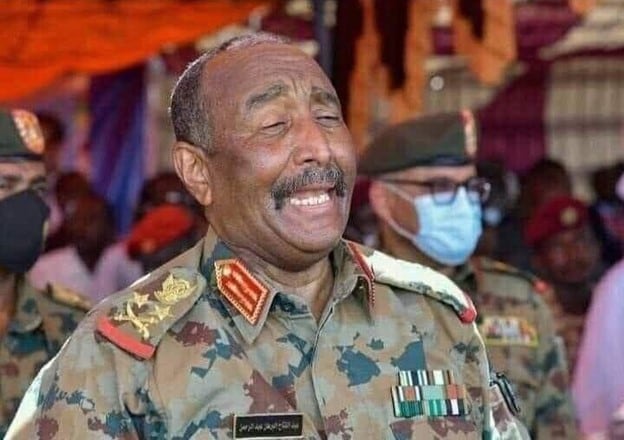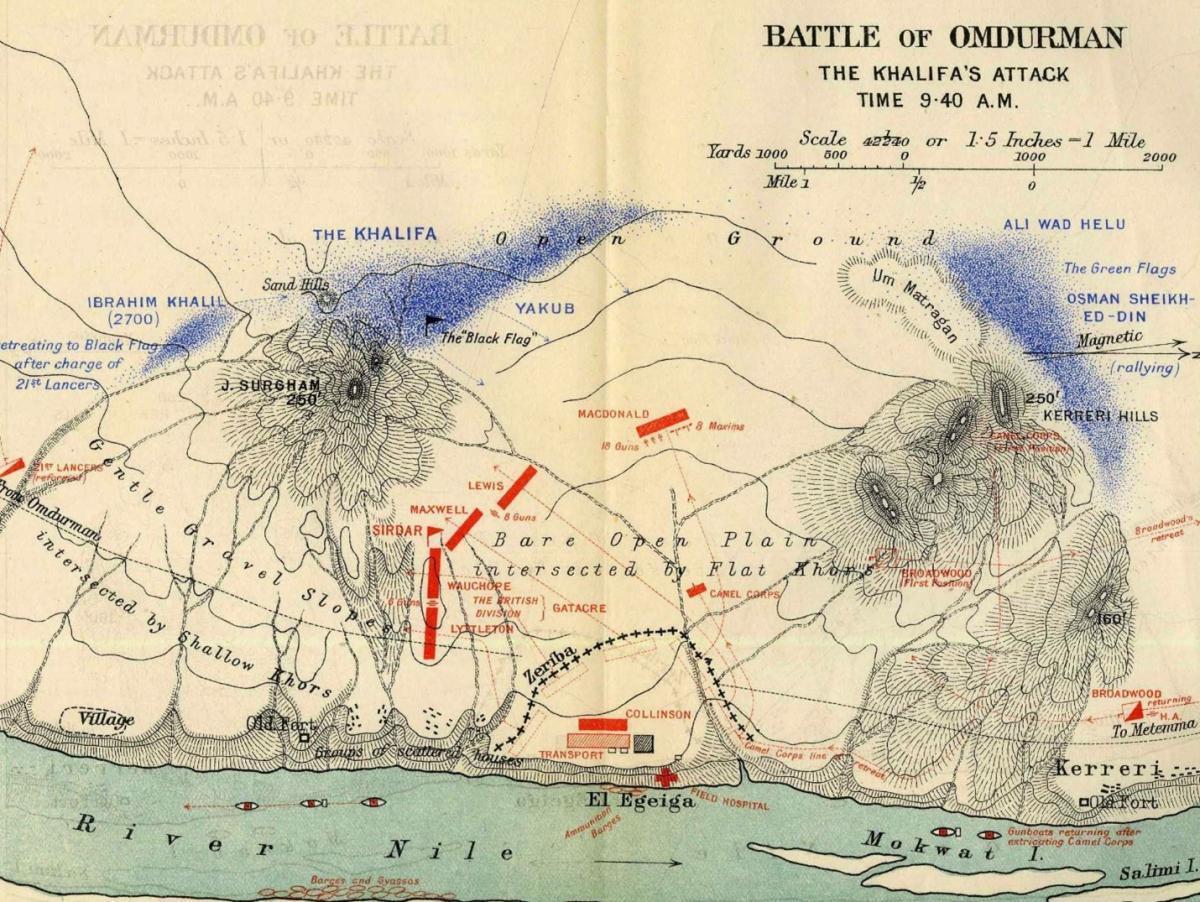Of course, no one is really apologizing for the past in Sudan, no one with real power in Khartoum. The closest was probably Sudanese General Muhammad Hamdan Daglo, nicknamed "Hemedti," admitting recently that the October 25, 2021 military coup of which he had been a perhaps reluctant participant had been a failure.

The call for an apology came from Sudan's ruler and de facto head of state General Abdel Fatah Al-Burhan, calling for Great Britain to apologize for the "crimes of colonialism," specifically for a conflict 124 years ago. Al-Burhan made the call at a ceremony marking the 1898 Battle of Omdurman (known as the Battle of Karari among the Sudanese) between the British Empire and Sudan's Mahdist state. Al-Burhan called what happened at Karari "a crime against humanity" and connected it directly to charges made in or about Sudan related to "ethnic cleansing" or "genocide." More than 30,000 Sudanese were slaughtered in four days of "intentional slaughter," he added.[1]
Al-Burhan was not the first to make this demand. Sudan's former dictator Omar Al-Bashir made the same call back in 2016. Even further back, I remember being subjected to a diatribe by President Al-Bashir, shortly after he was indicted by the International Criminal Court in 2008, before thousands of people in El-Fasher denouncing the United States for its treatment of Native Americans, Hiroshima and Nagasaki, and Vietnam. Although he devoted more time to the Americans than the British in his remarks that day, Al-Bashir also mentioned the United Kingdom. I remember telling my Sudanese diplomatic interlocutors later that the tirade against the U.S. was strange since Washington had had nothing to do with the ICC indictment, and the Sudanese knew it. The United States was not even a member of the ICC.
Of course, what Al-Bashir did then and Al-Burhan does now is to wave the bloody shirt of nationalism, often with a dose of religious chauvinism, to try to distract the masses from the present dire situation with wild charges about the past. Sudan today suffers from bloody military rule and disastrous governance with the possibility of famine looming on the horizon. Hundreds of Sudanese civilians have been killed, injured, or disappeared by Al-Burhan's security forces since October. This changing of the subject to distract from present troubles is not limited to Sudan. Similar charges are made in other regimes in the Middle East, against the West, or the Jews (or both). The kleptocratic dictatorship in Algeria wants an apology from France. In Latin America, leftist regimes such as those in Venezuela, Colombia or Cuba rail against the Spanish colonialism that ended two centuries ago. Mexico's President, himself of Spanish origin, recently demanded an apology for the Spanish conquest of the Aztecs 500 years ago.
SUPPORT OUR WORK

On the social media hellsite which is Twitter, I mocked Al-Burhan's call, noting that he should also ask for an apology from Egypt, which also had a colonial presence in Sudan. Big mistake, as I was deluged by Sudanese contesting the minutiae of 19th- and 20th-century history with me, saying that it was not actually "Egypt" that had hurt Sudan but regimes ruled by foreign Turks or Albanians like Muhammad Ali Pasha.
What I should have said is that Al-Burhan would not call on Egypt or Turkey to apologize because such a publicity stunt would anger both of those authoritarian regimes, with potential real consequences. Egypt is, of course, Al-Burhan's biggest patron and widely assumed to have plotted the October 25 coup with him. Turkey hosts an important Sudanese Islamist satellite channel that increasingly is pro-Sudanese Army. It is the West that can be called to apologize because the West will not get angry, is often wracked with self-loathing about its own past anyway, and there is always the possibility that it will agree to abase itself.

As for whether the United Kingdom should apologize for Karari itself, I am not British but it seems like a ridiculous idea. Karari was a battle, terribly one-sided and brutal, but part of a military conflict. It was part of a desultory war between two expanding empires, the British and the Mahdiyya, going back more than 15 years that included wins on both sides. Just ask Hicks Pasha and Gordon of Khartoum. The difference at Karari is that the outnumbered "British" (only one third of the 25,000 British troops were actually European, most were Egyptians and Sudanese) were heavily armed with modern weapons, artillery (115 artillery pieces versus 5 for the Khalifa's forces), and deadly Maxim Guns versus recklessly brave Sudanese often armed with swords and spears. The Mahdiyya was itself a predatory, aggressive power often at war with its neighbors. In 1889, an army from Sudan had even invaded Egypt and was wiped out by an Anglo-Egyptian force at Toski.
British rule in Sudan (disguised as Anglo-Egyptian rule) certainly had all the injustices, violence, stupidities, and brutalities of foreign colonial rule but for some British rule might seem quaintly mild compared to what came afterward once Sudan gained its independence in 1956. Sudan immediately entered into the longest civil war in Africa, waged between Khartoum and non-Muslim South Sudanese (1955-1972, 1983-2005) while rule in the capital was interspersed between democratic governments and military dictatorships – nationalist, leftist, and Islamist.
Rather than apologize for Karari, what would have been more realistic for the British to apologize for is making Sudan what it became: A state ruled by a clique centered on the tribes and clans of the Northern Nile Valley at the expense of the periphery whose dominance continues to this day. The British (and Egyptians) could also apologize for the borders and shape of Sudan. Borders like so many others in Africa drawn by the colonial power that make no sense. It is Britain that destroyed the Sultanate of Darfur in 1916 and forcibly incorporated it into Sudan. It was British explorers, colonialists and soldiers, under the Union Jack or under the flag of the Egyptian Khedive, that pushed Sudan's borders south deep into Equatorial Africa – to reach the sources of the Nile, to stamp out slavery, to keep the French out.
Perhaps Sudan would have had a much happier history if it had been a smaller riparian state ranging from Wadi Halfa to Kosti and if the South and Darfur and Kordofan had never been part of colonial Sudan. One of the propaganda themes the regime used in Sudan when I was there was that the West wanted to dismember Sudan and yet Sudan's borders (until 2011) were entirely the artificial product of Western colonialism. Al-Burhan, like Al-Bashir before him, fought to defend those old colonial borders which had become national ones. If not for the British, the gold mines of Darfur would have been in a foreign country. And what shall we say of the crimes committed by the Sudanese military over decades in the South and in Darfur defending those very colonial borders given as an imperial windfall to the Ja'alin, Shaigiya and Danagla by the British Empire? Who will apologize for that? Ordinary Sudanese may have been slaughtered at Karari but Sudan's rulers owe the British Empire much.
*Alberto M. Fernandez is Vice President of MEMRI and served as the U.S. Chargé d'Affaires in Sudan from 2007 to 2009.
[1] Youtube.com/watch?v=IqqM2i0xFwY, September 7, 2022.




